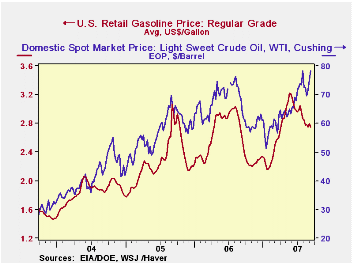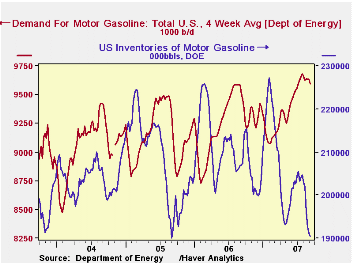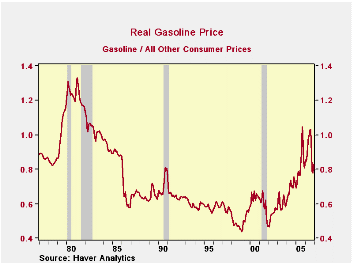 Global| Sep 13 2007
Global| Sep 13 2007Will Gasoline Prices Continue to Fall?
by:Tom Moeller
|in:Economy in Brief
Summary
U.S. retail gasoline prices have fallen 47 cents, or 15%, from the recent high of $3.22 in the middle of May. Momentum counts for something, but do the fundamentals behind gasoline prices argue for continued declines? The answer is a [...]

U.S. retail gasoline prices have fallen 47 cents, or 15%, from the recent high of $3.22 in the middle of May. Momentum counts for something, but do the fundamentals behind gasoline prices argue for continued declines? The answer is a clear "no."
First off, there's that spike in crude oil prices to roughly $80 per barrel. That is up 15% from the very recent low of $70 per barrel in early August.
Higher feedstock prices seem to suggest that retail prices will rise.
Easier demand for gasoline also contributed to the gasoline price drop. That decline could continue given that gasoline prices still are up nearly 20% from yearend '06, but that is the only (somewhat flimsy) reason to expect price declines to continue. 
Other fundamentals suggest higher gasoline prices, and one is the low state of gasoline inventories. Gasoline inventories are down 16% this year and most recently have slipped 7% after a brief rebuilding this past Spring and early Summer.
Lower U.S. production of gasoline and lower imports of petroleum products which usually would lift inventory did not stem the inventory decline.
So it is the combination of higher crude oil prices and lower gasoline inventories that suggest a rise gasoline prices, and possibly soon. The good, but hardly great, news is that the rise will come from a level of gasoline prices relative to all other prices which is down roughly 39% from the high in 1980.
Energy statistics are available daily in Haver Analytics' DAILY database, weekly in WEEKLY and OILWKLY, monthly/quarterly in USECON and OGJ, and annual in OGJANN. Data from Energy Intelligence are also available in OMI, NGW and WGI.
Tom Moeller
AuthorMore in Author Profile »Prior to joining Haver Analytics in 2000, Mr. Moeller worked as the Economist at Chancellor Capital Management from 1985 to 1999. There, he developed comprehensive economic forecasts and interpreted economic data for equity and fixed income portfolio managers. Also at Chancellor, Mr. Moeller worked as an equity analyst and was responsible for researching and rating companies in the economically sensitive automobile and housing industries for investment in Chancellor’s equity portfolio. Prior to joining Chancellor, Mr. Moeller was an Economist at Citibank from 1979 to 1984. He also analyzed pricing behavior in the metals industry for the Council on Wage and Price Stability in Washington, D.C. In 1999, Mr. Moeller received the award for most accurate forecast from the Forecasters' Club of New York. From 1990 to 1992 he was President of the New York Association for Business Economists. Mr. Moeller earned an M.B.A. in Finance from Fordham University, where he graduated in 1987. He holds a Bachelor of Arts in Economics from George Washington University.
More Economy in Brief
 Global| Feb 05 2026
Global| Feb 05 2026Charts of the Week: Balanced Policy, Resilient Data and AI Narratives
by:Andrew Cates






